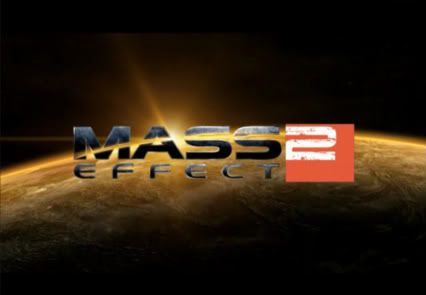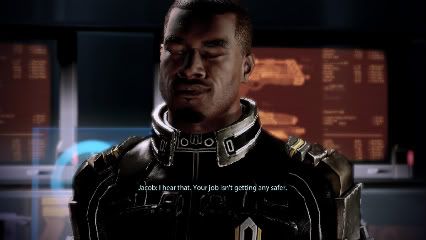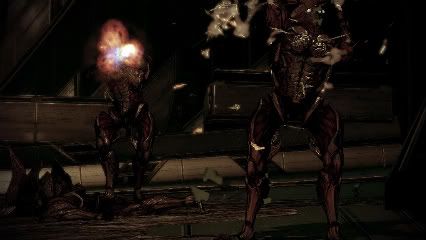 This article is SPOILER-HEAVY, if you’ve yet to play the game, then go buy it and do so immediately. That is, unless you’re a PS3 only kind of person, in which case you should probably go and wallow in your bitter tears (or just replay Uncharted 2).
This article is SPOILER-HEAVY, if you’ve yet to play the game, then go buy it and do so immediately. That is, unless you’re a PS3 only kind of person, in which case you should probably go and wallow in your bitter tears (or just replay Uncharted 2).
Mass Effect 2 is a big game, in every sense of the word. In terms of content, it’s by most standards pretty large; but in terms of its resonance within the gaming world it’s positively mass-ive (I’m so sorry, I couldn’t resist). Bioware have obviously put a great deal of time, money, blood, sweat, and tears into creating this game and so I feel it’s only fair to give the game more attention than a review or a summation.
The first part of this article will look at the flaws that just about stop ME2 from reaching greatness, while the second part will focus on why it should remain a shining example of Bioware’s dedication to brilliant game design.

ME2Jacob
Let’s start with game-journalist whipping boy Jacob. In a world populated with unique aliens, deep characters and heart wrenching back-stories, who thought it would be a good idea for the very first party member we recruit to be such a bland, uninteresting, charisma free soldier boy? Perhaps the same person who gave us Kaiden Alenko? The most interesting things about Jacob are his eyes. He blinks constantly and his eyes seem oddly detached from his face, roaming at will and occasionally threatening to pop out of his head. If they had done so, he’d probably have been much more of an interesting character. There’s a DLC add-on mission in there somewhere.
Jacob is guilty of this next point, which is Bioware’s side-quest fixation on mummy/daddy issues. Of the eleven characters (we’re including Zaeed in this), five of their personal missions that need to be resolved for the perfect ending are about characters confronting their parents or children. It’s not to say these quests are bad, or devoid of unique characteristics or even necessarily repetitive. It’s just that you have to ponder the lack of creativity that’s gone into the storytelling here, when almost half the main cast need to resolve issues with their parents or reconnect with their children (or kill them because they’re dangerous mind-eating aberrations) before continuing. It’s to Bioware’s credit that these quests don’t feel like doing the same task over and over again, but it does suggest perhaps a lack of ingenuity in their creation of back-story.
 The story – the collection of big cataclysmic events that rock the galaxy in Mass Effect 2 – is disappointingly hollow. The set pieces accompanying it are fantastic, encompassing the best moments of the entire game. But the story can be pretty much summarised in two or three lines and in sufficient detail. Let’s give it a try : Nasty Aliens being controlled by Nasty Robot-Aliens kidnap humans to make Nasty Human Robot Aliens. Hero puts together a team of intergalactic specialists to combat aliens and despite a slew of personal problems plaguing his team, eventually goes on to stop Nasty Aliens. The End.
The story – the collection of big cataclysmic events that rock the galaxy in Mass Effect 2 – is disappointingly hollow. The set pieces accompanying it are fantastic, encompassing the best moments of the entire game. But the story can be pretty much summarised in two or three lines and in sufficient detail. Let’s give it a try : Nasty Aliens being controlled by Nasty Robot-Aliens kidnap humans to make Nasty Human Robot Aliens. Hero puts together a team of intergalactic specialists to combat aliens and despite a slew of personal problems plaguing his team, eventually goes on to stop Nasty Aliens. The End.
OK, so Mass Effect 2 is in the middle of the trilogy, its purpose is to bridge the gap between the first and third games. But if the third game in the trilogy is similarly lacking in storyline depth it could do major damage to our retrospective opinion of the series as a whole. A space opera needs its twists and turns and we can’t help but wonder if Bioware had scrapped the over-large roster of companions (bye bye Jacob!), then perhaps the story could’ve been fleshed out a little more. Furthermore, the Collectors contained none of the intrigue or personal incentive of Mass Effect’s villains. Matriarch Benezia lent pathos and mystique to the first game, whilst the treacherous Saren gave us a worthy foe to pursue across the galaxy. The Collectors may have been equally as diabolical in their scheming, but there was no real focal point and no-one to personify their machinations. Instead it seems their purpose was simply to distract us from the Reapers, who are presumably being saved for the final instalment of the trilogy.
 Mass Effect is populated with a number of different alien races; the codex catalogues these races with information on their culture, their history and technology. This is all great stuff and it shows that Bioware have put in a significant amount of consideration when fleshing out their universe. But one niggling problem remains in the way these aliens are portrayed in the world. Despite the unique characteristics each race has, getting past the speech problems of the Elcor, or the all female Asari, each race acts like a funny looking human. So you get a hard-boiled Asari detective, reminiscent of a thousand others, the only difference being she’s blue. You get a love struck Krogan using poetry to woo his missus – only his motives for doing so are affected by his alien heritage. All too often the aliens and their issues are distinctly human in their mentality and their problems, with the racial differences ending up superficial. It would be interesting to see races that are so different and so ‘alien’ to humanity that their outlook and philosophy is nigh on incomprehensible. Even the Asari Justiciar – part of Asari culture supposed to be unique and interesting is able to liken herself to a monk or a chivalrous knight, and thus becomes an instantly recognisable archetype. Imagine a companion whose outlook was so diametrically opposed emotionally and philosophically to anything human, that working them out was a true mystery. Instead we hear about wives, daughters, sons, religion and marriage, topics that are all too familiar to us.
Mass Effect is populated with a number of different alien races; the codex catalogues these races with information on their culture, their history and technology. This is all great stuff and it shows that Bioware have put in a significant amount of consideration when fleshing out their universe. But one niggling problem remains in the way these aliens are portrayed in the world. Despite the unique characteristics each race has, getting past the speech problems of the Elcor, or the all female Asari, each race acts like a funny looking human. So you get a hard-boiled Asari detective, reminiscent of a thousand others, the only difference being she’s blue. You get a love struck Krogan using poetry to woo his missus – only his motives for doing so are affected by his alien heritage. All too often the aliens and their issues are distinctly human in their mentality and their problems, with the racial differences ending up superficial. It would be interesting to see races that are so different and so ‘alien’ to humanity that their outlook and philosophy is nigh on incomprehensible. Even the Asari Justiciar – part of Asari culture supposed to be unique and interesting is able to liken herself to a monk or a chivalrous knight, and thus becomes an instantly recognisable archetype. Imagine a companion whose outlook was so diametrically opposed emotionally and philosophically to anything human, that working them out was a true mystery. Instead we hear about wives, daughters, sons, religion and marriage, topics that are all too familiar to us.
Agree with this article? Disagree? Let us know what you think below and check back next week for part two.




















You asked for commentary on the seemingly flat alien races, so I am here to contribute.
I see where you are coming from with your criticism of the “human-alien” that is dominant in Mass Effect 2. However, I believe that in many ways this was the point. Throughout both games there are many comments on how humans are incredibly complex and adaptable to the point that it makes most other species incredibly uncomfortable. Samara (the Asari Justicar) mentions it near the end of her relationship dialog and she indicates that there is no other species who has the breadth of personality and dispositions that the human race has.
I believe that Mordin also mentions something about it as well (though I could be wrong with the character). He takes the stance that all other known species can be quickly identified based on their species: Krogans are violent, Asari are manipulative, etc. However, take the same size sample set of Humans and you can’t make the same assessment. The idea being that we are incredibly diverse within our own group.
These are clues from the developers. They built the world in such a way as to make Humans the outlier, not the standard. Measuring the other races by what humans have done or will do is not correct–we are supposed to measure Humans from the opposite side, as if we were Krogan, Turian or Batarian.
This allows the writers to implement various human-like character types into other species, but in a limited scope. If you catalog most of the characters in both games, you’ll see that they fit pretty well in predefined buckets with a small sample set of outliers (the poetry spewing, engineer Krogan being a good example). Conversely, you see Humans in every role imaginable–merchant, mercenary, soldier, biotic, engineer, dock worker, etc.
I have to admit that I was a little disappointed at the final battle and what you were fighting, but it certainly made sense given the analysis I just mentioned. During my second battle–after thinking this through for a couple days–I found the story to be much more fulfilling and the final battle to have more impact.
Hey, fantastic article man. Agree with you on each point made. Mordin was my favorite character.
Dude, did you forget the Terminator-reaper larva? That was some messed up junk right there.
You have a lot of solid points, but I don’t think that the daddy and mummy-issues that riddled the sidequests was lazy writing, it’s just the thing that fucks most people up; family. Plus Jacob’s sidequest was reason enough for him to be a character, his dad was a stone cold pimp.
I agree with all the points except the last bit about humans and aliens.
I didn’t like the fact that there were *SO* many recruit missions, they were kinda fun but….I don’t know, I was a bit disappointed. I wanted to see more content on the main mission.
I can agree with several of the points, and yes when you break down the story, it’s astoundingly cliché. It’s all about the fine print when it comes to making something good out of a cliché story however.
On the point of “Imagine a companion whose outlook was so diametrically opposed emotionally and philosophically to anything human, that working them out was a true mystery.” however, I feel I need to highlight some holes.
1: How will the designers come up with it, when they themselves are human?
2: How will you be able to relate to such a character, when everything about it is so far removed from humans that you can’t fathom it? Seems to go against Bioware’s attempt to make relatable characters (how will you relate to something that is diametrically opposed to you on every level?).
2,5: If it is diametrically opposed to humans on just about every level (emotional, philosophicall, etc), how will YOUR reaction be when you find out? Chances are you’ll hate it since it goes against, or at the very least stays very far away from, what you yourself think is right and good.
3: Why would you have that character as a companion? How will you recruit it, when everything it is and thinks is so far removed from everything that makes you human? Why would it care?
In closing, I understand what you are getting at: That we get too much stock-characters, often with little effort to try and make them unique. On that point I agree that it is very often the case.
Try comparing the characters in-game to one another instead, and you’ll probably find that they’re about as diverse as you’re going to get. And still be able to relate to.
To switch your arguement around, I’m quite sure the reason Bioware made them so human-like is so you’d have an easier time relating to them. A romance, for instance, would be impossible with the character from the above quote.
Personally I think Bioware has done a very good job with characterization in Mass Effect 2, hell they even make the random “backdrop”-npcs feel alive.
Just thought I’d put it out there.
you use a lot of big words lol. loved the article. i do agree that the game was a bit of a disapointment, but i can only hope that this was their “teaser” to ME3. i loved the game but when it came to your 2nd or 3rd play through, lets face it,it was boring. ME1 was great. ive played it 6 times and never got bored.
i also hate the fact that i always lose 3 characters at the end lol.
great article.
just to make sure you all know……i did love ME2
–i also hate the fact that i always lose 3 characters at the end lol.–
Get all of your people loyal then do the following:
1: Sent Legion through the vent
2: Give Garrus or Miranda control of the second squad
3: Have Legion escort folks back to the ship
4: Have Garrus or Miranda be in charge of defending the door
5: Have Jack do the biotic field
Ta-da! No one dies!
Accurate. The writing in ME2 took a clear hit, due to recruitment and loyalty missions. One had to ponder not only the lack of creativity in having personal missions be a combination of daddy issues, but why they weren’t only woven into the main plot, but why they weren’t even a logical condition toward the end game scenario.
Here’s my Plot Analysis of Mass Effect 2:
http://www.youtube.com/watch?v=rR558wTjOUU